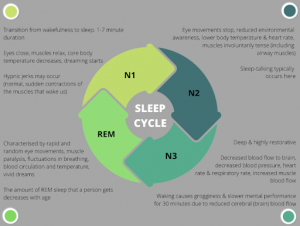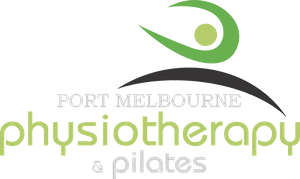Whether you’re recovering from an injury or preventing an injury, adequate sleep is just as important as your rehabilitation exercises and maintenance strategies. Sounds relatively simple, right? Science says otherwise!!
Sleep Cycle – The Basics
One sleep cycle is broken up into two phases; Non-REM (three sub-stages N1, N2, N3) and REM. Each cycle takes approximately 90-120 minutes to complete, and continually repeats itself throughout the night. Adequate sleep is determined by completion of each stage and multiple cycles.
Below is an infographic on the stages of sleep.

Sleep Hormones Specific for Recovery
- Melatonin: Informs the body that it is time for sleep. Prepares the body for regulation of the below hormones which are important for recovery.
- Growth Hormone: Essential for regeneration, growth and repair of body tissues. Also critical for decision-making. Poorer rest can result in slower healing times and non-optimal decision making during sport and training.
- Prolactin: Regulates and decreases inflammation. Poorer sleep can lead to increased inflammation, thus increasing the risk of injury and delayed healing.
- Cortisol: Released when the body is stressed, including when injured. High levels of cortisol is counter-productive for healing processes. Rest reduces cortisol in the blood-stream and allows for more efficient healing.
Importance of adequate sleep on performance and recovery
- Improved tissue regeneration and strength
- Maintenance of neuronal plasticity – improved memory consolidation and motor learning
- Improved alertness and concentration – enhanced reaction times and coordination, reduces likelihood of lapses in judgement
- Decreased fatigue – linked with decreased pain and optimal decision-making
- Reduced stress levels – reduces risk of delayed recovery times
- Adequate cardiovascular health – oversleeping and under-sleeping is linked with increased risk of cardiovascular diseases
- Improved motivation and mood
- Improved pain modulation
How to Optimise Sleep:
- Go to bed and wake up within an hour everyday
- Apply the 10/4/3/2/1 rule:
- Avoid coffee 10 hours before bedtime. Caffeine has a half-life of 6 hours (50% of the amount you drink is still in your blood 6 hours later)
- Avoid alcohol 4 hours before bed, food 3 hours before, technology 2 hours before and TV 1 hour before bed
- Limit technology – blue light suppresses melatonin and relaxation brain waves
- Go to bed in a dark room
- Optimise room temperature – optimal range is 19-21°C
- Have a warm bath 60-90mins pre-bed
- Clothing as loose and as little as possible – too tight can restrict lymphatic drainage (waste removal system)
- Abdominal wall massage using a small soft ball – stimulates vagus nerve and parasympathetic nervous system (relaxation system)
- Establish a routine to optimise the brain’s sleep expectation effects
How physiotherapists can help
- Recommend sleeping postures specific to injuries, pain or niggles
- Recommend physio-approved mattresses and pillows
- Education about sleeping apps to track sleep (e.g. Sleep Cycle, Calm)
- Assist with bed mobility and sleeping aids
- Referral: psychology, occupational therapy, dietician (appetite is also regulated during sleep)
Products PMPP Physios Recommend:
The physios at PMPP can provide you with a referral for a good quality mattress (based on your sleeping needs, positions and injuries where relevant). We also stock some fantastic pillows from ‘Therapeutic Pillow’ which are in the clinic ready for you to trial during your next visit.
Additionally, We also stock ‘SALT LAB’ Magnesium Oil Spray which you can spray on your body for a more restful night (it’s great for sore muscles and headaches).
Read below for previous blog posts:
-Emily

